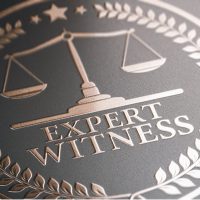How And Why Are Experts Used In Personal Injury Cases?

At some point in your personal injury case, you may hear your attorney talk about getting experts, or employing experts, to assist you. But what is an expert, when is one used, and what are the legal issues that relate to the use of experts in court?
Why Are Experts Needed?
Experts are needed in court because in many cases, there is technical, scientific, or specialized knowledge that you, your attorney, or the average lay person, just doesn’t have.
For example, let’s imagine that you were injured when a ladder collapsed. You contend that the ladder was defective. To prove your case, you will have to show how a properly functioning ladder is made or used, and why the ladder that you were injured on, did not meet that standard.
How do you do that? The only person who really has expertise in that field, would be someone experienced in the construction or engineering of ladders (or a general engineer, with experience in equipment load management or construction equipment).
So, when the average person doesn’t have the necessary background information to provide meaningful, knowledgeable testimony, an expert is needed.
Qualifying as an Expert
But not everybody can walk into court and testify as an expert.
Experts are people who have sufficient expertise, experience, training or education, in a given field—the field the expert will be testifying about in court.
An expert need not have a Harvard degree—in fact, an expert may have no higher education at all. A roofer who has been building roofs for 20 years would be an expert in a roofing construction case, regardless of his or her educational background or schooling. It’s not always about a resume or credentials; it’s often just about whether the expert has the background to qualify as an expert in a particular field.
The Expert’s Opinion
Sometimes, there is a legal fight over whether an expert can be qualified as an expert. But often, the question is not whether the expert is legally qualified as an expert—it’s whether his or her opinion can be used in court.
Not every expert opinion is admissible. The law wants to avoid “junk science,” or experts that use unscientific methods to come to their conclusions. On the other hand, much of science is not fully established, and just because a scientific theory or opinion is not widely accepted, doesn’t mean it is wrong or unsound or should be excluded from a trial.
So, the law has developed a test to see if expert testimony is admissible. As a general rule, an expert’s opinion must be derived from scientifically sound methods, using enough data that is accepted by the scientific community, and the opinions and data used, must be relevant to, and properly applied to, the facts and issues in the case.
Questions about your personal injury case? We can help you understand what you can expect. Contact our Rhode Island personal injury lawyers at Robert E. Craven & Associates at 401-453-2700 for help.
Sources:
casetext.com/rule/rhode-island-court-rules/rhode-island-rules-of-evidence/article-vii-opinions-and-expert-testimony/rule-702-testimony-by-experts#:~:text=If%20scientific%2C%20technical%2C%20or%20other,form%20of%20fact%20or%20opinion.
testifyingtraining.com/daubert-frye-used-expert-witness-testimony-admissibility-rhode-island/
